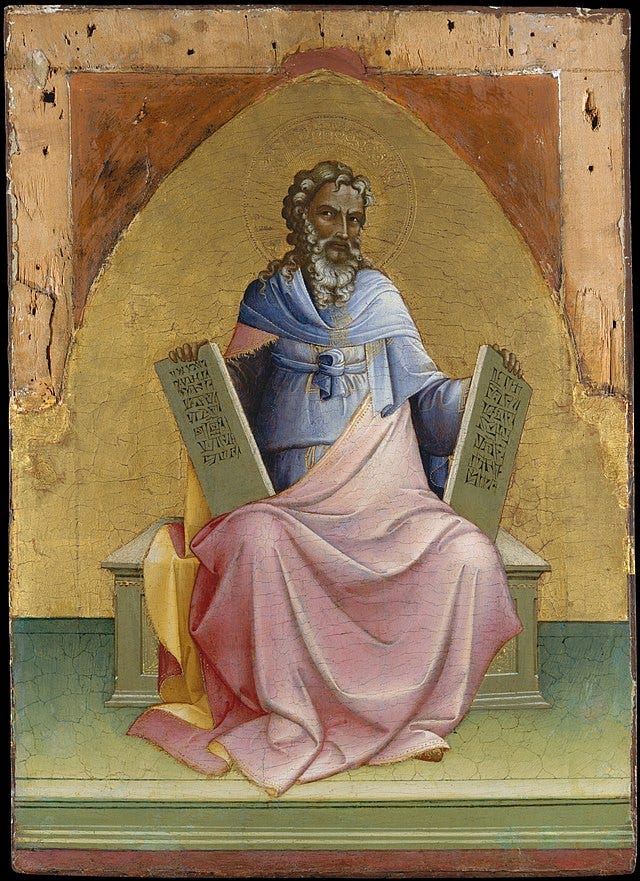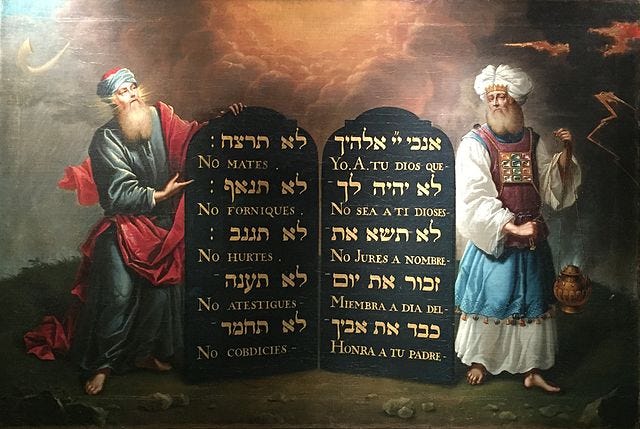When I looked at the lectionary texts this week to think about what I might include in this newsletter, I was excited to see that we were approaching the middle of the book of Exodus in Morning Prayer.
Chapters 19-23 are known as the ‘Covenant Code’ and make up some of the most important chapters of the book of Exodus, because it is here that God gives the people the law.
You can imagine my dismay, then, when I realised that we skipped from chapter 19 straight to chapter 24 between yesterday and today - but fear not! In this newsletter, I’m going to share with you three things you need to know about the covenant code - the ‘missing piece’ in this week’s lectionary.
Moses, Lorenzo Monaco, circa 1408 –10 (wikimediacommons.org)
As you are probably aware, the first half of the book of Exodus is largely narrative. We have the story of Moses’ early life, the plagues that God sends against the Egyptians, and the beginning of the Israelite’s journey into the wilderness.
The biblical scholar William Propp says:
'the second half of Exodus addresses a single question. How can Israel abide in relationship with the transcendent deity, whose full essence the earth cannot bear?’1
The ‘how’ of this question is answered in part by the giving of the law, known here as the ‘covenant code’
Here are three important things about it:
The Importance of ‘Covenent’
The idea of ‘covenant’ is key to the Old Testament. It comes up again and again as a way of talking about God’s relationship with the people of Israel.
A covenant, in Hebrew ‘berit’ (בְּרִית), is a formal agreement. People in the Bible enter into covenants with one another (such as that between David and Jonathan in 1 Sam 20), and God enters into covenants with the people as a whole. The first use of covenant language in the Bible is found in Genesis 6. Here, God makes a covenant with Noah, and through him the rest of humanity, promising never to wipe out life from the earth again.
In Genesis 15 & 17 God also makes covenants with Abraham, and through him his descendants, promising to make them his chosen people and to give them a land in which to live.
God is faithful and therefore will never transgress the covenants he makes with Israel, even when the people fall short.
The covenant code, then, is a framework to show the people how to live out their covenant with God. Or how to uphold their ‘side of the bargain’ if you like.
God has entered into a covenant with Israel, and in return, the people are to live in accordance with God’s law as given to Moses at this point in Exodus.
Law and Encounter
It is notable that the Covenant Code is given in the context of an encounter with God. For those who consider the covenant code to begin at Exodus 192, the law is given in the context of a ‘theophany’ which is another word for an encounter with God. The text says this:
‘Now Mount Sinai was wrapped in smoke, because the Lord had descended upon it in fire; the smoke went up like the smoke of a kiln, while the whole mountain shook violently. 19 As the blast of the trumpet grew louder and louder, Moses would speak and God would answer him in thunder. 20 When the Lord descended upon Mount Sinai, to the top of the mountain, the Lord summoned Moses to the top of the mountain, and Moses went up’
So although Moses alone was called up the mountain into the nearer presence of God, this is one of the times in Exodus when the whole people witness the power and glory of God, whose presence shakes the earth.
Another theophany in Exodus occurred when God went before the people in a pillar of cloud/fire to guide them - but this theophany is far more terrifying!
The way in which the law is given in the context of a theophany reminds us that the law itself is a mode of encounter with God, and reveals more of who He is.
Different kinds of law
Aron de Chaves Amsterda, 1700, wikimediacommons.org
The covenant code contains laws about different things, but it also contains different groups of laws. One of the most important of these is the 10 commandments found in Exodus 20. Historically, the church has privileged this group of laws above others.
Have you ever wondered why you see the 10 commandments written on church walls, rather than, say, laws about the goring ox?
The answer is in part because of how the 10 commandments are introduced. Ex 20:1 says ‘Ex 20:1 'Then God spoke all these words’.
The ten commandments are presented as the words of God, and in Hebrew tradition they are referred to sometimes as ‘the ten words’.
This is in contrast with other laws, where God says to Moses ‘These are the ordinances’ rather than the words ‘that you shall set before them’ (Ex 21:1).
This shows us that there is some hierarchy in the laws related to who was responsible for communicating them.
Biblical law is strange and sometimes difficult for us to engage with, which is probably why - as we have seen this week - it is often left out of the lectionary!
Despite this, though, it is an important aspect of the biblical text and reveals more of God’s nature to us. The idea of covenant, especially, is incomplete without the idea of covenant, so I hope you can carry on your journey through Exodus keeping this ‘missing piece’ in mind.
W.H.Propp, Exodus19-40, (NewYork: Doubleday, 2006), p33
There is some disagreement between scholars as to whether the Covenant Coe should be understood to begin at chapter 19 or 20





